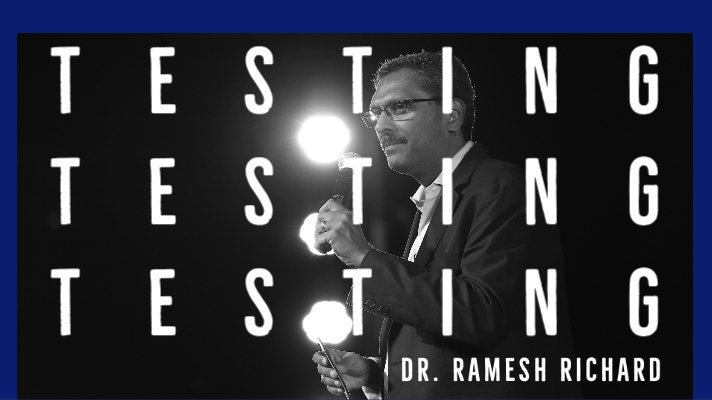“Testing, Testing, Testing …” Part III – A Security Check
August 20, 2020“Testing, Testing, Testing …” Part II – A Maturity Check
August 27, 2020“Testing, Testing, Testing …” Part I – An Identity Check
Testing, Testing, Testing … Global PAN(DEM)IC and a Sound Faith
Part I of III
Dr. Ramesh Richard
An Identity Check
Disruptions always test the quality of our self-identity. We form identities for other people’s benefit, and sometimes at another’s expense. Psychologists and sociologists point to multiple types of identities with many inputs and components.
For instance, identity politics divides by race, color, caste, religion, gender and so on. Identity economics categorizes society by monetary markers, whether in a three-class or nine-class hierarchy.
As with the American Great Depression, widespread crises serve to flatten the condescension of the rich and the posturing of the poor. This 2020 pandemic does not respect the economic gap, nor help bridge the politics gap, at least while we are all understanding ourselves better and becoming more real to our neighbors.
Our loved ones, with whom we now live 24/7, are beginning to know us better, but also, mostly unintentionally, they are helping us to know ourselves better. In an ironic turn, we are putting on external face masks while we unmask our interiors.

Disruption, especially, unmasks our character. A key pointer to the quality of our identity is how we handle surprises, losses and interruption. How consistent or conflicted are we on the inside? How have we formed the values that control our behavior? What are the sources of our identity-formation? Does it spring from family expectations, peer pressure or public models? From pleasing those to whom we belong, from how we wish to appear to others, or from how we externally perform?
When housed in isolation, the three features of self-identity—our belonging, our appearance and our performance—take a severe beating. Our multiple identities, drawn from our expected social roles, fall apart as proximity with those we seek to please or impress is suspended. We become uncomfortable because we have prioritized how others view us more than how those we live with and love most view us. Any coherence and constancy we had previously established for our self-identity are now incompatible with our “authentic” self.
But wait! Whether under normal or plague conditions, Christian self-view depends neither on values derived externally nor value sourced internally. We discover, establish and grow with a better identity source, an ultimate one. A Christian embraces internally the external source of her or his personal value, which arises from the outside and is redeemed on the inside. This new self-value is what is ultimately true of one’s Self.
Where, or better, to whom, do we go to find what is ultimately true about ourselves? Horizontal sources that encourage us to be “true to our self,” to do what is natural, prove defective. If I were to be true to my natural self, I would contribute more to the disruption. I don’t think you want that.
How may this deformed self be rescued? Not by a self-based reformation, but by regeneration into a new self, a replacement of the old self. In Christianity, one is born again from above into a new, true Self. Our spiritual redemption makes it possible to subscribe to what the Christian’s God says about our new true identity in him.
Here’s how the Trinitarian God of Christians revises the old situation and replaces it with enduring value so that a new identity can be strengthened, despite any short-term disruption of roles and responsibilities or long-term deprivations of routine and relationships:
One, we belong to the loving Father as his children, a family status never to be disrupted, even if we run away from him. He chose us in love, knowing everything about us.
Two, God will never devalue how we appear (an external matter so crucial to many) because of apparent lack, real loss, aging or death. Why? Because we are now part of his beautiful bride, whom he is transforming into a spotless beauty to be someday presented in stunning display, more delightful and talented than any participant in sexist Miss Universe competitions.
And, three, what about our performance? God’s recognition does not depend on our success. Social acceptance relies heavily on conditional and cultural metrics; God’s Holy Spirit blesses his children fully and never loses use for the gifts he has given us to serve others. He never withdraws his endowments of calling and competence as we pursue fruitfulness.

Our new identity in the Triune God is like an oxygen mask that helps us survive the turbulence, even a crash-landing. I usually neglect the flight steward’s announcement at take-off. But one sentence always gets my attention: “If you are traveling with a child, please attend to yourself first, then the child.” I have wondered if this self-care was too self-preserving. Not at all. We don’t care for ourselves as an end, just as a means to care for others who need more care than ourselves. Otherwise, we both die. And in Christian principle, we are willing to die that others might live. Our God-sourced identity becomes a new mode to execute our service to others. Our service roles no longer form our identity; they give us outlets to minister out of our identity throughout this time of distress.
During this unexpected grant of homebound time, may I fulfill professorial obligation and encourage you to look up Scripture on the incredible truths of personal identity? If you have a cross-reference feature on your electronic or hard-copy Bible, check the three verses I give you below. It will lead you to many, many more.
- Belonging as God’s child
I am known and chosen by God the Father (1 John 3:1). - Appearance as God’s bride
I am loved and valued by God the Son (John 15:13). - Performance as God’s instrument
I am gifted and made competent by God the Spirit (1 Cor. 12:7).
Let me close this identity soundness test with a rich thought from Dr. J. I. Packer, whose Knowing God my 92-year-old mother-in-law devours every year. Process these three paragraphs slowly, absorb deeply, and then claim fully. How God thinks about you and what God holds about you is found in who God says you are:
“What matters supremely, therefore, is not, in the last analysis, the fact that I know God, but the larger fact which underlies it—the fact that he knows me. I am graven on the palms of his hands. I am never out of his mind. All my knowledge of him depends on his sustained initiative in knowing me. I know him because he first knew me, and continues to know me. He knows me as a friend, one who loves me; and there is no moment when his eye is off me, or his attention distracted from me, and no moment, therefore, when his care falters.
This is momentous knowledge. There is unspeakable comfort—the sort of comfort that energizes, be it said, not enervates—in knowing that God is constantly taking knowledge of me in love and watching over me for my good. There is tremendous relief in knowing that his love to me is utterly realistic, based at every point on prior knowledge of the worst about me, so that no discovery now can disillusion him about me, in the way I am so often disillusioned about myself, and quench his determination to bless me.
There is, certainly, great cause for humility in the thought that he sees all the twisted things about me that my fellow humans do not see (and am I glad!), and that he sees more corruption in me than that which I see in myself (which, in all conscience, is enough). There is, however, equally great incentive to worship and love God in the thought that, for some unfathomable reason, he wants me as his friend, and desires to be my friend, and has given his Son to die for me in order to realize this purpose” (Knowing God, Downers Grove, IL: InterVarsity Press, 1993, 41-42).
Truly nothing can disrupt the quality of this identity. There you are! A Trinitarian Christianity provides personal meaning in the face of natural disaster. It passes the identity check. You can come to accept what the Ultimate Source of your Self truly believes about you. You can exchange your old, false self-identity that was defined by your roles for a new, true self-identity that you express through your roles and responsibilities. Will you embrace it more and more to better endure this time of personal gloom and global doom?

About the Author: Dr. Ramesh Richard serves as the founder and president of RREACH; general convener of the 2016 Global Proclamation Congress for Pastoral Trainers; Professor of Global Theological Engagement and Pastoral Ministries at Dallas Theological Seminary; and founder and chairman of Trainers of Pastors International Coalition (TOPIC). He holds a Th.D. in Systematic Theology from Dallas Theological Seminary and a Ph.D. in Philosophy from the University of Delhi. To learn more about the ministry of RREACH, click here. For other articles from Dr. Ramesh Richard click here.


